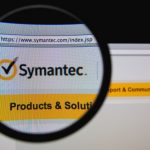Symantec and Bay Dynamics partner to fight insider threats

Insider threats are a major problem for all types of organization and more than ever firms are looking for data loss prevention strategies.
Cyber security specialist Symantec is integrating Bay Dynamics' Risk Fabric analytics platform with its data loss prevention and other technologies, to create a central point of behavioral analytics that dynamically delivers mitigation actions to keep malicious insiders from stealing sensitive data.
Do you know where your cloud data is stored?

IT security heads may be drastically underestimating the size of their organization’s cloud presence, leading to potentially huge security risk, a leading expert has warned.
Speaking to ITProPortal at the recent InfoSecurity 2017 event in London, Darren Thomson, EMEA CTO at Symantec, said that it was "a massive, massive concern" that many CISOs and CIOs were unable to accurately say how big their company’s cloud presence was.
Symantec pins WannaCry on North Korean Lazarus group

There have already been suggestions that the now infamous WannaCry ransomware was the work of the North Korean hacking group Lazarus. Security firm Symantec now says it is "highly likely" that Lazarus is to blame, having unearthed further evidence of the re-use of code from other attacks by the group.
But while the links to Lazarus are strong, North Korea denies that it was involved in any sort of state-sponsored attack, dismissing such claims as "a dirty and despicable smear campaign." It is thought that the group -- also responsible for attacking Sony Pictures and stealing $81 million from the Bangladesh Central Bank -- operated independently for personal gain.
Symantec successfully blocks more than 21 million 'WannaCrypt' ransomware attempts

The 'WannaCrypt' ransomware has been a worldwide dilemma, impacting many countries. Luckily, the malware only impacts older versions of Microsoft's operating system -- Windows 10 is not vulnerable. Also immune to WannaCrypt is macOS and Linux distributions. Unfortunately, many people run older versions of Windows, but Microsoft has been very active in issuing patches for them -- including for the now-unsupported XP.
Patches aside, security software can protect vulnerable computers too. In fact, today, Symantec announces that it has successfully blocked almost 22 million WannaCrypt attacks. The company even leveraged machine learning in its fight against the ransomware.
Vault 7: Symantec says CIA hacking tools revealed by WikiLeaks were used in 40 'Longhorn' cyberattacks

The CIA's range of hacking tools revealed as part of WikiLeaks' Vault 7 series of leaks have been used to conduct 40 cyberattacks in 16 countries, says Symantec. The security firm alleges that a group known as Longhorn has been using tools that appear to be the very same ones used by the CIA.
While it would be obvious to jump to the conclusion that the CIA was itself responsible for the attacks -- and that Longhorn is just a branch of the CIA -- Symantec opts for a rather more conservative evaluation of things: "there can be little doubt that Longhorn's activities and the Vault 7 documents are the work of the same group."
The lure of keygens helps spread Gatak malware through the enterprise and healthcare industry

Malware spreads through various channels, and numerous methods are used to fool people into unwittingly installing it. In many cases, the promise of getting something for free -- naming expensive software -- is enough to trick a victim into infecting their own computer.
It's far from being a new tactic, and warnings have been issued to fans of torrenting for some time. Keygens (small programs that promise to provide unlock codes and product keys for big-name software titles) are being used to help spread the Gatak or Stegoloader Trojan. Something that is interesting about this malware campaign is that it is specifically targeting enterprise users, with a particular focus on the healthcare industry.
Symantec acquires LifeLock for $2.3bn

Security firm Symantec is buying US identity theft protection services company LifeLock, Reuters has reported. The deal is worth $2.3 billion (£1.87bn), and it is claimed that this is Symantec’s way of amping up sales at its Norton cybersecurity unit.
According to the report, Norton is still profitable, but its sales are in decline for one simple reason -- mobile. Norton comes preloaded on a large number of traditional computers, but people are turning more towards mobile devices.
Symantec buys Blue Coat Systems

Symantec has decided to purchase Blue Coat Systems for $4.65 billion in a move that will allow it to more thoroughly protect its users from a variety of threats online.
The deal will also see Blue Coat’s CEO, Greg Clark, become Symantec’s new CEO. This will help the company fill the role which has been vacant since its previous chief executive, Michael brown stepped down in April due to poor financial results.
Symantec introduces website encryption service

Symantec today announced the global release of a new product which will help companies encrypt user data on their websites.
The new product is called Encryption Everywhere, and it will be offered through hosting providers. According to a press release following the announcement, there will be a couple of levels of encryption and general protection the new service will offer, but Symantec would love to see every "legitimate" website in the world have at least the basic level of encryption by 2018.
Symantec unveils new unified business services security solution

Symantec has released a new solution promising to unify corporate security, something that’s becoming increasingly harder to control.
The Symantec Advanced Threat Protection (ATP) is, according to the press release, "the first solution that can detect and remediate advanced threats across control points, from a single console with just a click, all with no new endpoint agents to deploy".
Google demands Symantec grovel over security certificate fiasco or risk the consequences

Google has fired warning shots at Symantec, threatening that Chrome would start to flag the company's security certificates as unsafe. The threat comes in a blog post penned by Google software engineer Ryan Sleevi who is still seething after Symantec employees issued a number of unauthorized security certificates.
Some of the certificates were owned by Google -- including Google.com -- and a Symantec-led audit suggested that the problem affected just 23 test certificates. But further probes revealed that there were in fact more than 2,500 certificates involved. Google is understandably fuming and is now holding Symantec to ransom.
Spam drops below 50 percent of email for the first time since 2003

For the first time in more than a decade the amount of spam has fallen to less than 50 percent of the total volume of email.
According to the latest Symantec Intelligence Report, the overall spam rate has dropped to 49.7 percent, the first time a figure this low has been recorded since September 2003.
F-Secure does a Symantec and shuts down its failed cloud storage service

Storing your personal data in the cloud makes a lot of sense. It provides a handy backup, and you can access your content from anywhere. I write about a lot of cloud storage services, but I only really use established ones from the likes of Google and Microsoft.
I would consider, and use, storage services from other companies, but the problem is they can’t be trusted. So many of the sites I sign up to -- usually purely to write about -- shut down within a year or so. These aren’t storage services from firms you’ve never heard of either. Today’s discontinued service is Younited by F-Secure.
Japanese porn sites may infect your iPhone and iPad with malicious apps

If you are an adult that likes to visit Japanese porno websites on your iPhone or iPad, I will not judge you. It is your life and you can do with it what you want. Quite frankly, watching x-rated videos is safer than visiting sex workers, as you cannot catch a virus from your Apple device.
Or can you? While not a virus per se, Symantec has discovered a malicious app in the wild that is targeting iOS users that search for Japanese sex videos and visit certain spam links. Unfortunately, wearing a condom on your finger will not protect you -- here is how to stay safe.
Security software market grows more than 5 percent in 2014

Security is always in the news so it hardly comes as a surprise that the market for security products is growing. According to research specialist Gartner the worldwide security software market was up 5.3 percent in 2014.
In terms of value the market is worth $21.4 billion, however, the make up of that market is shifting. Low growth in endpoint protection platforms and a decline in consumer security software -- possibly because of improved built-in security in the latest versions of Windows -- are balanced by high-growth areas, such as security information and event management (SIEM), secure Web gateway (SWG), identity governance and administration (IGA) and enterprise content-aware data loss prevention (DLP).
Recent Headlines
Most Commented Stories
BetaNews, your source for breaking tech news, reviews, and in-depth reporting since 1998.
Regional iGaming Content
© 1998-2025 BetaNews, Inc. All Rights Reserved. About Us - Privacy Policy - Cookie Policy - Sitemap.